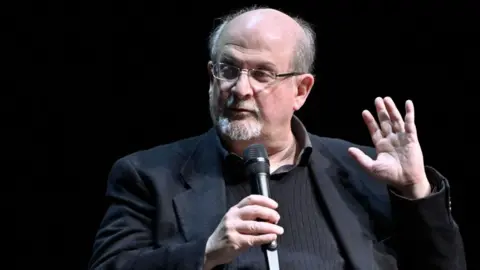Salman Rushdie: Iran blames writer and supporters for stabbing
 Getty Images
Getty ImagesIran has "categorically" denied any link with Salman Rushdie's attacker - instead blaming the writer himself.
Mr Rushdie, 75, was left severely injured after being stabbed on stage at an event in New York state. He is now able to breathe unaided.
He has faced years of death threats for his 1988 novel The Satanic Verses.
Earlier, US Secretary of State Anthony Blinken accused Iran's state media of gloating about the attack, calling its behaviour "despicable".
Iranian media have extensively commented on the attack, calling it "divine retribution".
Iran's state broadcaster daily Jaam-e Jam highlighted the news that Rushdie might lose an eye following the attack, saying "an eye of the Satan has been blinded".
As news emerged of Friday's attack, eyes turned to Tehran where the fatwa - religious edict - calling for the writer's assassination was first issued more than three decades ago.
But on Monday, Iran's foreign ministry spokesperson Nasser Kanaani - giving the country's first official reaction - said Tehran "categorically" denied any link, adding "no-one has the right to accuse the Islamic Republic of Iran".
However, he said freedom of speech did not justify Mr Rushdie insulting religion in his writing.
"In this attack, we do not consider anyone other than Salman Rushdie and his supporters worthy of blame and even condemnation," the spokesman said during his weekly press conference in Tehran.
"By insulting the sacred matters of Islam and crossing the red lines of more than 1.5 billion Muslims and all followers of the divine religions, Salman Rushdie has exposed himself to the anger and rage of the people."
Iran had no other information about Rushdie's assailant except what has appeared in media, he added.
A spokesman for UK Prime Minister Boris Johnson said it was "ludicrous" to suggest Mr Rushdie was in any way to blame for the attack, adding it "was not just an attack on him, it was an attack on the right to free speech and expression".
Earlier, the UK's shadow foreign secretary David Lammy had pressed the government to urgently put diplomatic pressure on Iran to apologise and withdraw the "truly sickening" comments.
Mr Blinken had earlier denounced Iran's state institutions for inciting violence against the author.
He said in a statement that Mr Rushdie had "consistently stood up for the universal rights of freedom of expression, freedom of religion or belief, and freedom of the press".
"While law enforcement officials continue to investigate the attack, I am reminded of the pernicious forces that seek to undermine these rights, including through hate speech and incitement to violence.
"Specifically, Iranian state institutions have incited violence against Rushdie for generations, and state-affiliated media recently gloated about the attempt on his life. This is despicable."
Mr Blinken added the US and its partners would use "every appropriate tool" at their disposal to stand up to what he called "these threats".
On Sunday, Mr Rushdie's son said the author was still in a critical condition: "Though his life-changing injuries are severe, his usual feisty and defiant sense of humour remains intact," he said.
The family were "extremely relieved" when Mr Rushdie was taken off a ventilator on Saturday, he said, adding that his father was able to "say a few words".
The author's agent Andrew Wylie said the celebrated novelist suffered severed nerves in one arm, damage to his liver, and would likely lose an eye.
The man charged over Friday's attack - named as Hadi Matar, aged 24 - has pleaded not guilty to charges of attempted murder and assault. He is accused of running on to the stage and stabbing Mr Rushdie at least 10 times in the face, neck and abdomen.
The novelist was forced into hiding for nearly 10 years after The Satanic Verses was published in 1988. Many Muslims reacted with fury to it, arguing that the portrayal of the Prophet Muhammad was a grave insult to their faith.
Mr Rushdie faced death threats and the then-Iranian leader, Ayatollah Ruhollah Khomeini, issued a fatwa calling for Mr Rushdie's assassination, placing a $3m (£2.5m) bounty on the author's head.
The fatwa remains active, and although Iran's government has distanced itself from it, a quasi-official Iranian religious foundation added a further $500,000 to the reward in 2012.
